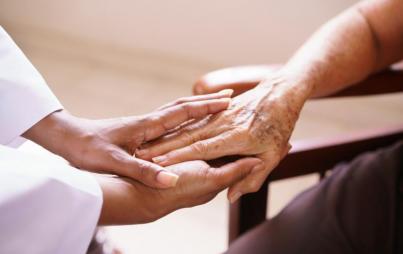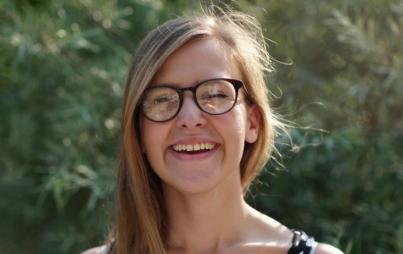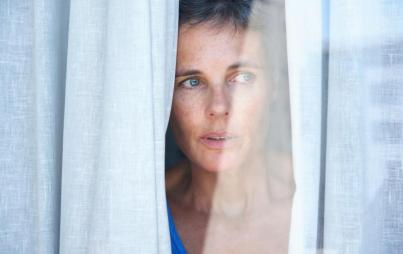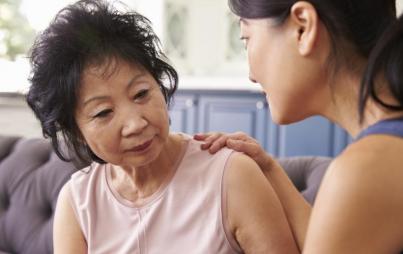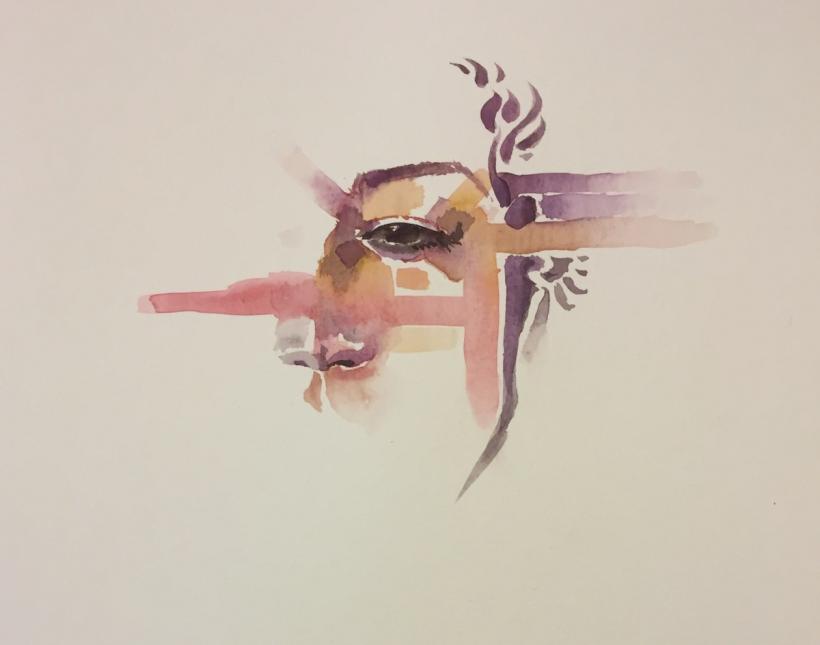
Untitled Watercolor by Anthony Diecidue
“Look how happy she is!” I’m holding a photo of my mother and father cutting their wedding cake. Photos of my mother smiling are a rarity; something caught on film only before her children were born. Never after.
“Oh, she just glowed that day. She was thrilled.” Aunt Sira had brought a manilla envelope overstuffed with decades-old photos from the several gigantic boxes she had inherited when Grandma died in 1999. She’s still going through them.
I separate the memories on my kitchen table, sorting photos of my younger sister to give to her teenaged twins, and shuffling aside the chubby-cheeked toddler photos of my older brother for his new wife.
My mother in these photos… Sometimes she looks like herself, and sometimes she does not.
And when I say this to my aunt, she agrees and tells me about the time she went to sleep-away camp one summer and returned to a sister with a new face.
I ruminate on that. Perhaps that new face was the beginning of my mother’s misfiring neural circuits, showing up quietly like a summer storm — the flowers trampled and wet, and when the sun is out again, the water on the grass the sun’s cruel mirror, blinding anyone trying to suss out the damage of what had just been a beautiful day mere moments before.
The torrential downpour when I was six years old nearly drowned my mother. The clouds never parted after that. Electric shock therapy, psychiatrists, medicine, extended mental hospital stays, possible misdiagnoses, bipolar disorder, schizophrenia, suicide attempts. I didn’t understand it then, and it’s still hard to understand now.
All I know is that one day, my mother simply stopped loving me.
To this day, my fractured heart beats with trepidation and fear of further breakage, because at any moment, my best friend, my sister, my husband, can one day stop loving me, just as my mother did. To be connected means to one day be cut off. Heartbreak is inevitable. Loss is guaranteed.
My pile of my parents’ wedding grows; long-sleeved polyester dresses worn by paternal aunts, giant orchid corsages pinned to my grandmothers. No one foresaw my mother’s sickness, my mother’s sadness. My father and mother eventually divorced, and my father married a woman who kisses him back. Everyone needs love. Everyone needs affection.
You Might Also Like: Just Because I Didn't Have A Great Mother Doesn't Mean I Can't Be One
The disconnect between my mother and me is difficult for other mothers to understand. “Of course your mother loves you!” they would cluck. They feel the pull of an invisible cord still connecting them to their children, always hoping for their joy, fearing their being hurt. But my mother was cordless. She didn’t love me, and after therapy, I learned and can say now, not because she didn’t, but because she couldn’t. She couldn’t hug me. She couldn’t say I love you. She couldn’t be the one person in my life I knew loved me just for being myself.
She was a mother who couldn’t mother.
Mental illness absorbed my mother’s maternal soul and left a hollow shell that morphed her face and body into someone unrecognizable. The bloat and weight gain and hair loss from her different medicines and thyroid issues gave her an unrecognizable new face, and my siblings’ strong likeness to my father made me joke that I had inherited the good looks of our mailman.
If I can’t have a mother, though, maybe I can simply look like her. Maybe that will be enough of a connection. I will grasp at anything to find and prove that this woman wanted me at one point in her life.
Because even now, decades after outgrowing polo shirt dresses and ruffled socks, I am still and always will be the little girl craving the the scoop and enclosure of my mother’s arms. The smoke of memories I cling to cruelly wisp between my fingers the harder I try to grasp them.
I pick up a photo of my mother and father in front of his 30th birthday cake. I will not be born for another year. My father is smiling, and I place a photo of my sister at 11 next to his face; it is uncanny how much they look alike — the blue eyes, the round cheeks. I find a photo of myself at 14, and I place it next to my mother, who is young, smiling, 33, and untroubled.
I am her.
This pleases me in a way I didn’t expect, and I memorize her smile; lock the look into my brain. Deep, unyielding sadness and paranoid voices only she could hear caused her to take on a particular way of smiling when we were growing up where she only opened her mouth enough to make her lips part. That is her face I know; one that was never happy.
And here’s a photo of her making exactly that face, with my sister and me flanking her, grinning. The juxtaposition hurts: that we could be in good spirits when she couldn’t. I put it aside in my Maybe Throw Away pile, and sift through the photos again, trying to find more of my mother’s genuine, cheery smiles.
I then find a photo that startles me. It’s a small square; the type from a photo booth that you cut up and give to your friends. She is flirting with the camera, a seductive smile on her face, her hand under her chin like a model, fingers extended. I stare at it. “How old is she here?” I ask my aunt, and I dash out the room.
“Where are you going?” My aunt calls out to me.
I return to the kitchen with a small box. I furiously dig through it.
“How old is she there?” I repeat, impatient.
My aunt holds the small photo close and far, close and far, trying to find the perfect distance without her glasses. I am still tearing into my box, my cheeks hot.
“I think,” Aunt Sira says, studying Mom’s makeup, Mom’s hairstyle, “Probably 20?”
Then I find it: my International Youth Travel Card from my trip to Europe, visiting my roommate who was studying abroad. I had just gotten my nose pierced on a whim, and we were going to France the next day. I needed to take a photo in a photo booth, which an attendant would then cut and paste onto this card, laminating it together so I could travel cheaply through the country.
My YTC identification photo shows me flirting with the camera, a seductive smile on my face, my hand under my chin like a model, fingers extended.
I was 20.
I put her photo and my card side by side. An exact match. The joie de vivre, the playfulness, the sense of humor, all inherited from my mother.
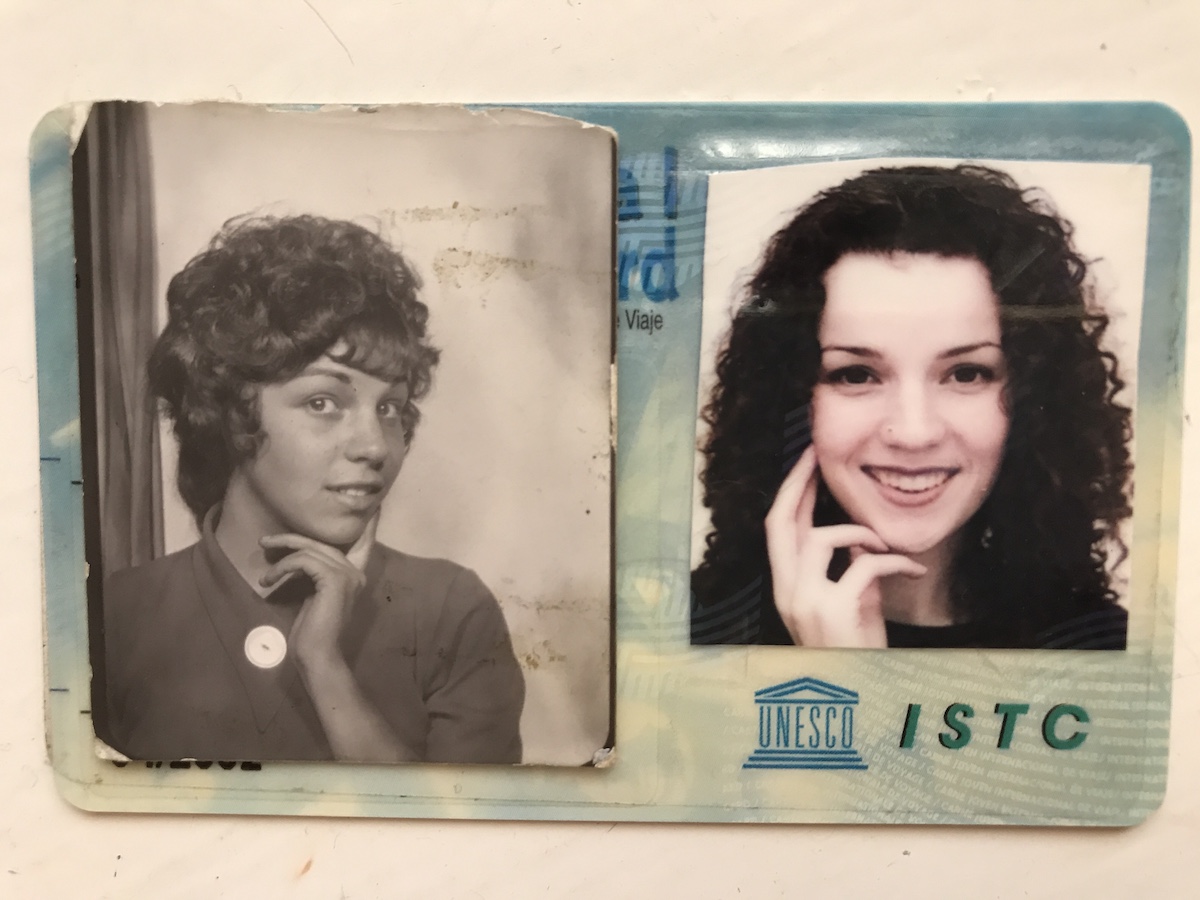
A genetic connection; a bond we share that cannot be broken.
My aunt smiles. She gently straightens the photos with a finger. “Sometimes, when I only catch a quick glimpse of you,” she says, her voice catching, “I almost call you by her name.”
And I beam. A smile the exact same shape as my mother’s.



